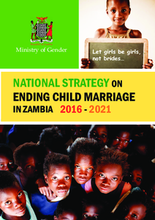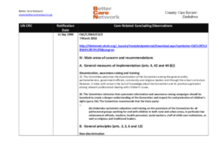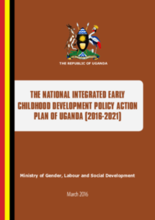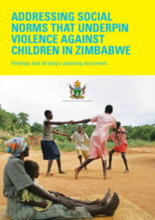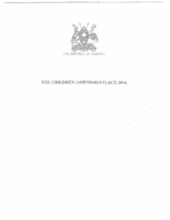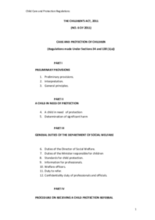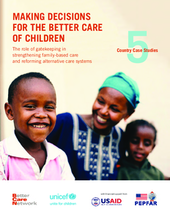Displaying 41 - 50 of 121
In order to strengthen the national response to child marriage, the Government of Zambia developed a five-year National Strategy on Ending Child Marriage (2016-2021).
This country care review includes the care-related Concluding Observations adopted by the Committee on the Rights of the Child.
This country care review includes the care-related Concluding Observations adopted by the Committee on the Rights of the Child.
The National Integrated Early Childhood Development (NIECD) policy of Uganda seeks to address multi-dimensional needs of young children through building more effective and coherent efforts among sectors to achieve positive early childhood development out comes for all children.
This report highlights key findings from a social norms study conducted in Zimbabwe to understand the drivers of violence affecting children.
This bulletin highlights the key objectives and key amendments of Uganda's Children Act Amendment of 2016. It also outlines the process by which the Bill was developed and approved and lays out next steps for implementing the Act and ensuring the rights of children in Uganda.
The EAC Child Policy is the culmination of various processes geared towards the harmonisation of standards on and approaches to the implementation of child rights in the EAC.
The Children (Amendment) Act of 2016 is an Act to amend the Children's Act Cap. 59 of Uganda to enhance the protection of children; to strengthen the provision for guardianship of children; to strengthen the conditions for intercountry adoption; to prohibit corporal punishment; to provide for the National Children Authority; repeal the National Council for Children Cap. 60 and to provide for other related matters.
These DRAFT Regulations on the Care and Protection of Children of the Children’s Act of Zanzibar offer a definition of a child in need of protection and outline the general duties of the Department of Social Welfare in regards to providing that protection.
Published jointly with UNICEF, this new BCN Working Paper focuses on the role of gatekeeping in strengthening family-based care and reforming alternative care systems. This Working Paper reviews different approaches to gatekeeping in five countries--Brazil, Bulgaria, Indonesia, Moldova, and Rwanda--to consider what has and has not worked, to analyze lessons learned from practice, and to reflect on the implications for improving policy and programs in this area.

